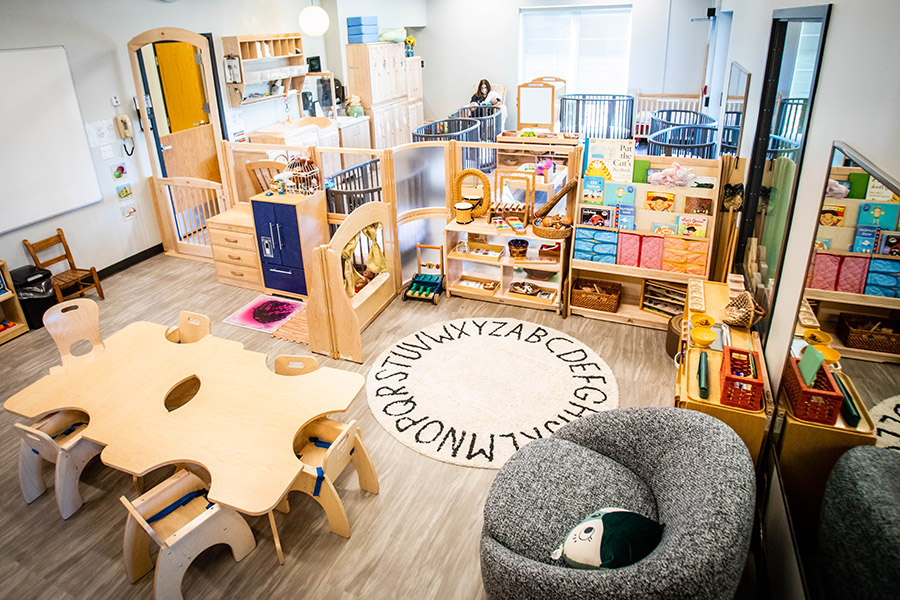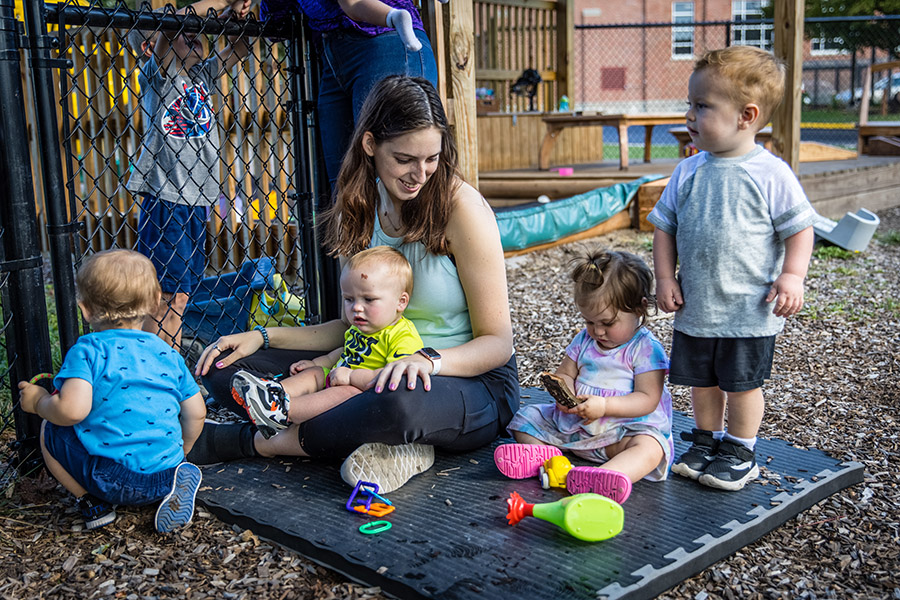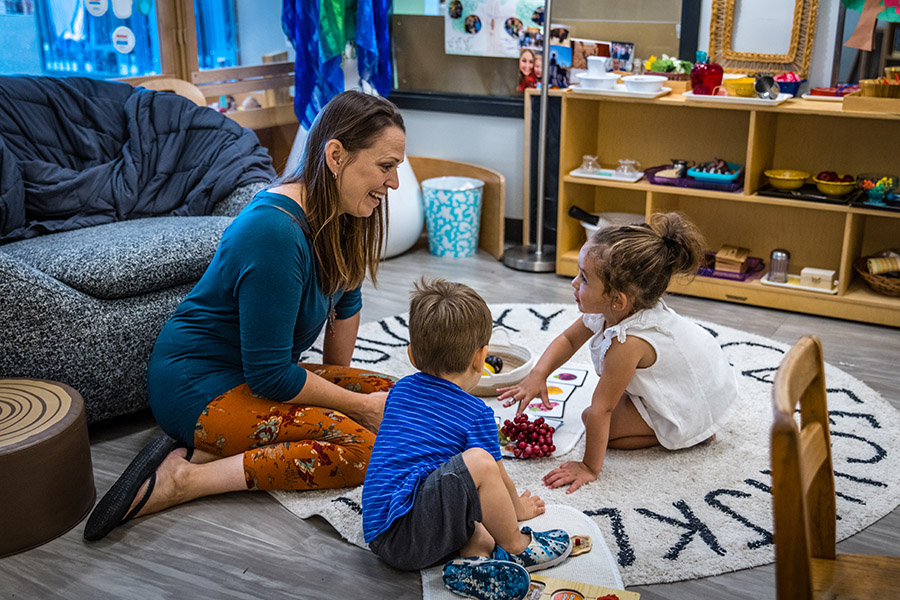Two years after Northwest Missouri State University’s School of Education received a state grant to offer a child care and early education program, and one year after the University opened its early child care center, the program is thriving and helping people of all ages advance their learning.
“We’re working every day to make it better,” Laura King, the director of Northwest’s Horace Mann Laboratory School and the Phyllis and Richard Leet Center for Children and Families, said. “It’s a partnership with our families, with our teachers, with our pre-service teachers. It’s been a real blessing, and to see how far we’ve come in one year is a huge accomplishment.”

Northwest renovated space in the Leet Center at Brown Hall to provide infant and toddler child care for children ranging in age from 6 weeks to 3 years. (Photos of Lauren Adams/Northwest Missouri State University)
As a result, Northwest reconfigured the Leet Center in Everett W. Brown Education Hall, which also serves preschool children ages 3 to 5, by transforming a preschool classrooms into a space that opened in 2021 and now provides infant and toddler child care for children ranging in age from 6 weeks to 3 years.
To get to that point, School of Education faculty and pre-service teachers invested time in professional development and research to perfect every aspect of the child care center. Additionally, the child care center earned accreditation from the National Association for the Education of Young Children (NAEYC), which is granted based on evidence showing the center is meeting educational guidelines – a major milestone in just its first year.
Since the child care center’s opening, staff have continuously adapted their practices to best meet the needs of the families they serve.
“It’s been amazing to see it make it a year and be successful,” Michelle Vaught, a lead teacher at the child care center, said. “To see all of the work that went into simply just getting us open, and we’re thriving and we’re fully licensed. We’re fully NAEYC-accredited, and we did all of that in a year and that’s huge.”

Northwest's early childhood center features outdoor as well as indoor spaces for children to learn and play. Student employees, including Kristiana Wolfgeher, a freshman human services major from Kansas City, Missouri, gain profession-based experience by working at the center.
With more than 20 children attending the center this fall, the facility is at its capacity and enrolling others from its waiting list as children progress to other classrooms. Families served by the Leet Center may participate in the Missouri child care subsidy program, which provides child care support to families who need it most.
At the same time, the early child care center helps Northwest provide valuable profession-based, clinical experience for early childhood majors in combination with the Leet Center’s mission as a community hub for quality child care with expert, professional supervision – providing a win-win for future teachers and families in surrounding communities.
“They’ve really stepped up to the plate, and they’ve done so well,” King said of the students gaining experience at the early childhood center, which maintains a 4-to-1 child-to-staff ratio. “We have a great little community.”

Racheal Wood, an associate teacher in the infant-toddler area, and staff adapt activities and the composition of rooms as children grow and develop.
Lexy Minton, a junior early childhood major from St. Joseph, transferred to Northwest last year and began working at the early childhood center during her first semester at the University. She said she appreciates the opportunity to take her classroom learning to the center and work alongside experienced early childhood teachers.
“We get to see the teachers model it and act it out, and we get to see firsthand how they handle situations,” Minton said. “That’s been really helpful for me. I’ve realized how children can learn through play at such a young age.”
Throughout each day, staff move from room to room to ensure each child’s needs are met. Each classroom maintains a set of goals that help guide lead teachers and practicum students through activities and help children achieve developmental milestones such as crawling, walking and self-feeding. A mobile app also helps staff communicate in real-time and share updates with parents about their child’s activities and development.
The makeup of each classroom also evolves as the children grow. In the infant room, items are arranged to encourage crawling, and small tables help children learn to pull up to a standing position. A toddler room includes climbing structures and sometimes an obstacle course to help children work on balance and coordination. Items such as books, colored shape-sorters and puzzles are readily accessible to help children develop fine motor and gross motor skills. In the 2-year-old classroom, children set and clean their tables.
“Everything is set up in a specific way,” Vaught said. “The cool thing is the activities are easy to hard, and they go left to right, and so that helps them with early reading skills. Then, as they develop their skills, the activities get harder. It’s very interesting how it goes and how intentional everything is.”
Founded in 1905 as a regional teacher training institution, Northwest Missouri State University has evolved into comprehensive state-assisted university that serves about 8,500 students and places emphasis on profession-based learning to help graduates get a jumpstart on their careers.
Simultaneously, the School of Education’s mission is to prepare caring teachers who possess the highest level of professional knowledge, skills and dispositions necessary to help all students learn in a diverse and ever-changing world. Northwest education programs have been fully and nationally accredited since 1954, with the most recent accreditation renewal continuing through 2027, by the Association for Advancing Quality in Education Preparation (AAQEP) and the state of Missouri through the Department of Elementary and Secondary Education (DESE).
In 2018, Northwest became one of only three universities in the nation to call itself a two-time recipient of the American Association of State Colleges and Universities’ Christa McAuliffe Excellence in Teacher Education Award; the University received its first McAuliffe Award in 2006. The national recognition highlighted Northwest’s reimagined, social justice-infused curriculum and abundant clinical field experience placements for education majors. Within the curriculum, teacher candidates observe and practice their teaching in urban, suburban and rural settings with students from diverse backgrounds.
The School of Education operates two laboratory centers on the Northwest campus to facilitate hands-on training for education candidates, staffed by master teachers – the Horace Mann Laboratory School, which serves students in kindergarten through sixth grade, and the Leet Center for Children and Families, which comprises the early childhood center and a preschool. Observation and practicum hours are carried out conveniently located in the same building, Everett W. Brown Education Hall, as the academic classrooms and faculty offices. This arrangement allows expert teachers to partner with child care providers to prepare early childhood educators in a real-world setting, while providing student employment and clinical practice opportunities. In 2021, the International Association of Laboratory Schools recognized Horace Mann and the Leet Center as an outstanding laboratory school.
Northwest teacher candidates graduate with more than 550 hours in profession-based clinical practice. With that experience, more than 98 percent of Northwest education program graduates find employment or continue their education within six months of completing their degrees.